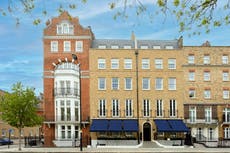Travel expert Simon Calder answers nine questions on your next US trip
Rules for teenagers, Hawaiian escape, jab certification all explained by our in house travel expert

Your support helps us to tell the story
From reproductive rights to climate change to Big Tech, The Independent is on the ground when the story is developing. Whether it's investigating the financials of Elon Musk's pro-Trump PAC or producing our latest documentary, 'The A Word', which shines a light on the American women fighting for reproductive rights, we know how important it is to parse out the facts from the messaging.
At such a critical moment in US history, we need reporters on the ground. Your donation allows us to keep sending journalists to speak to both sides of the story.
The Independent is trusted by Americans across the entire political spectrum. And unlike many other quality news outlets, we choose not to lock Americans out of our reporting and analysis with paywalls. We believe quality journalism should be available to everyone, paid for by those who can afford it.
Your support makes all the difference.As soon as the US opened up once again to British travellers after a border closure of almost 20 months, the travel correspondent of The Independent returned to continue with his astronaut training course at a secret base in California ahead of his next space mission.
During a brief spell of weightlessness, Simon Calder paused for an hour to tackle key questions from readers about the new rules for transatlantic travel from the UK.
Teenage kicks
Q: We will be in Florida over Christmas. Both my wife and I are double-jabbed and our 15-year-old son has had his single dose.
My understanding is that although in the UK he is considered “fully vaccinated”, this is not the case in the US and so he will need to take a test between day two and five after our arrival.
My question is: how readily available are the required tests in the US ? Are pharmaceutical chains like CVS offering testing at their retail sites?
Clacka 57
A: As you say, unvaccinated (or partially vaccinated) under-18s are allowed in without quarantine, but they must take a post-arrival test – actually on day three, four or five of their stay.
In addition, fully vaccinated adults are recommended to undergo such tests, though this is not a requirement.
For the avoidance of doubt:
- The test can be a swift lateral flow (antigen) test.
- There is no obligation for the test to be medically supervised.
- You cannot use a free NHS lateral flow test; tests for international travel must be paid for privately.
I spent some time in the US checking out the testing options for people in your position.
Big airports have testing centres, but prices tend to be high even compared with UK prices. The cheapest airport deal I could find was at Orlando International Airport, where a rapid antigen test with AdventHealth costs $65 (£47). Similar tests at other airports were in the range $75 (£55) to $100 (£73).
While a professionally administered test will give the highest possible chance of an accurate result, I can understand that many families will choose instead to buy lateral flow tests, for example from the giant pharmacy firms, Walgreens and CVS Health. A pack containing two tests typically cost $25 (£18).
Q: I am flying to New York on 17 December with my children (hopefully). They both have had Covid -19last month and recovered. My son is 17 and has the NHS Covid recovery pass. My daughter is 14 and can’t get it from NHS.
How can we prove she has had covid within 90 days of travel, to avoid the testing obligations? It would be much easier if everyone followed the same WHO rules.
Ryan B
A: The World Health Organisation (WHO) does not make rules for individual countries to follow. If it did issue a set of rules that every nation must follow, life would, as you indicate, be so much easier for international travellers.
However, there is very little possibility that governments will surrender their public health powers to an international organisation.
Meanwhile all the traveller can do is comply with the many different policies in force around the world. In your daughter’s case, that means probably having to take a pre-departure lateral flow test. Despite her recent episode of Covid-19, after another five weeks she is most unlikely to provide a “false-positive” result.
Q: We are travelling to San Francisco on Boxing Day via Dublin from Manchester. My 15-year-old son had Covid in September. How can we get proof of recovery from Covid to enter Ireland (the rules are that its accepted 180 days in Ireland)?
He is showing as negative on a lateral flow test, but he still may show as infected on a PCR. The NHS aren’t issuing recovery certificates for under 16s and my son’s GP won’t provide anything either, and just refer us to the NHS 119 service.
My thinking is for purposes of entering Ireland he will be fine with a recovery certificate and for entry into US with a negative lateral flow test.
Alex Irwin
A: Travelling to the US via Dublin is a valuable option for many people in Great Britain: there are excellent connections from a wide range of airports, and fares can be low.
In addition, Ireland is very much on the way to America, so you won’t undergo the wasteful situation of flying away from the US to Amsterdam, Frankfurt or Paris to pick up your flight, which then may fly directly over the very airport you left three hours earlier.
However, in your specific case there is a serious drawback: Dublin airport does not adopt the same policy as other big hubs, where the general rule is that there is no need to meet the conditions of the intermediary nation for a very brief stop.
The tricky situation your son finds himself is a result of the odd and arbitrary UK decision that you mention: not to offer recovery certificates for under-16s.
By the time you travel to the US, though, it will have been 90 days since your son had Covid and therefore it is most unlikely he will show up as positive. So I would plan to take a PCR test on the morning of departure from Manchester and use that for entering the US as well – no point in getting duplicate tests.
Q: Supposed to be going to the US in 2022 and to Malta in 2022 for a wedding. One of my sons is only 15 and so will only have the one jab. I understand that neither allow single jabs. Any news/views on whether this will change?
Must be thousands of us in the same boat.
Brad Bourbon
A: Thousands in the same boat? I would say millions of people are affected by the divergence between the UK’s vaccination policy for under 16s and overseas countries’ definitions of being fully jabbed.
The current situation looks pretty unsustainable in the long term, and so I believe an accommodation will be reached to make it possible for young people to travel without undue problems. You can possibly accelerate the progress by writing to your MP and urging them to take up the issue.
Top form
Q: I’ve noticed that we have to sign an attestation form to verify that what we say is true prior to checking in. The link on the BA “manage my booking” seems to be six pages long, whist America, United and Virgin Atlantic link to basically just the one CDC original form.
Do you think that BA would accept the shorter CDC original form?
“Geben 3”
A: The only attestation form I know to be acceptable is the five-page CDC version here.
My understanding is that it needs to be printed out and signed by the passenger (or a parent if appropriate). I cannot imagine British Airways will reject this official form.
On a wider point: I have encountered problems uploading documents for a number of different BA trips, and always seem to have to go to the desk at the airport to have documents checked before departure. I wonder how long this cumbersome system will prevail?
Long-distance information
Q: We’re hoping to fly out to the US next year, firstly to New York, on to Hawaii and finally San Francisco. What are the current regulations/requirements to enter Hawaii?
Kim KC
A: To answer your direct question: as from last Monday, 8 November, the Pacific island state came into line with the rest of the US, welcoming fully vaccinated and tested international visitors.
More broadly, I should point out that the current rules may well have changed agin by the time you travel to the US – so do keep checking.
If you are travelling off-peak (ie outside the UK school holidays) there is no great need to book flights more than a few weeks or even a few days in advance.
North of the border
Q: Looking at going to Canada. Currently 12-15 year olds are only allowed on Covid vaccine in the UK. But Canada is insisting they have two vaccines or have to quarantine for two weeks on arrival.
Do you think Canada will bring in the same entry rules for under 18s as the US – ie with no quarantine – before Christmas?
“1904”
A: I am afraid that the position the UK has adopted for under-16s – they need only one vaccine – is causing significant problems for families travelling to many parts of the world. I believe that there will be some rational convergence towards what is acceptable proof of a traveller’s low-risk status, but I would be surprised if it were to happen by Christmas.
To be blunt, Canada is unlikely to be in a hurry to find an immediate solution for a relatively small proportion of British visitors.
I recognise it is probably of little comfort to you, but the UK represents the second-largest group of foreign visitors to Canada after the US, so I imagine by next summer restrictions will be eased.
Cruise control
Q: In December, we are flying out to Florida to join a cruise the following day. How does my unvaccinated eight-year-old do the “day 3-5”post-arrival test?
Also timelines dictate that we will need to do a pre-travel test on Christmas Day which means we won’t have access to any of the usual retail options. So will a video supervised test suffice?
Graham 2k
A: The quick and easy answer to your first question is that your eight-year-old can’t comply with the rule. Getting on board the plane to the US will probably be easier if you simply sign the attestation saying that you will arrange the necessary test.
Since the test will not be necessary, that is a reasonable solution for a tangled situation.
Next, I am puzzled that you say: “Timelines dictate that we will need to do a pre-travel test on Christmas Day:”
The Americans are very flexible about the timing of pre-departure tests. If you are booked to travel on Boxing Day, for example, then the tests can be carried out on 23, 24, 25 or 26 December. So that should give you plenty of options.
A reminder that a lateral flow test is acceptable – no need for a slow and expensive PCR test.
You also ask: “Will a video supervised test suffice?”
Only if it is approved by the US authorities and conducted with an American company. While in theory you could arrange such a test, in practice it will be much easier to get a professionally administered UK-based test – for example offered at the airport on your day of departure.
Pass go
Q: I’m flying out to New York this Saturday, to spend six weeks in the northeastern US. There is enormous excitement here after a two-year wait!
Have you had any issues with using your NHS Covid Pass to access venues in New York, given that they have their own system (the Excelsior Pass)?
If so, what do I need to do to make sure my experience is as seamless as possible?
James D
A: I was in New York State this week but not in NYC. This single state provides an excellent example of how fragmented things are in the US: while in upstate New York, mask-wearing is optional for anyone who is fully vaccinated, and I faced no controls entering premises, in the biggest American city things are very different.
New York City Covid rules stipulate that for indoor dining, museums, aquariums, zoos and performance venues, “people 12 and older are required to show identification and proof they have received at least one dose of a Covid-19 vaccine”.
The Excelsior Pass you mention is actually a state-wide scheme that promises: “Secure proof of an individual’s Covid-19 vaccination record and negative test results.” But I have not been able to identify any way for a foreign visitors to access the scheme.
So how do you prove your vaccine status? Well, in the US, everything seems pretty analogue.
Unlike the European Union, where the (really very successful) EU Digital Covid pass is ubiquitous, there is no coherent nationwide system in the United States – despite an attempt by New York State to promote such a scheme (known as Blueprint) based on its Excelsior Pass.
Carrying your NHS Covid Pass letter, which conveniently is in English, should be sufficient. You can get it from the NHS in the UK nation you live in.
Always carry your passport, too, because some people will want to see it as well as your vaccination certificate.



Join our commenting forum
Join thought-provoking conversations, follow other Independent readers and see their replies
Comments